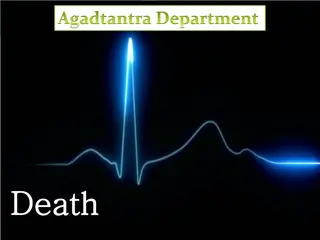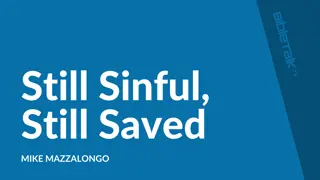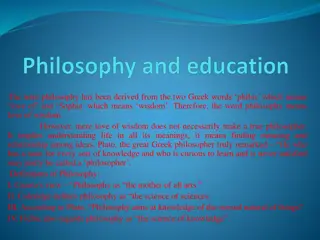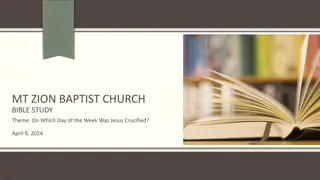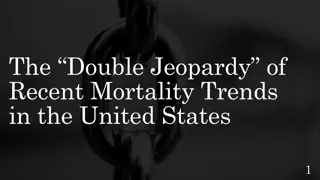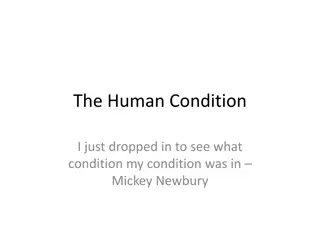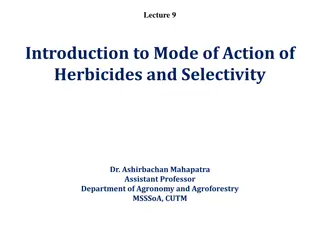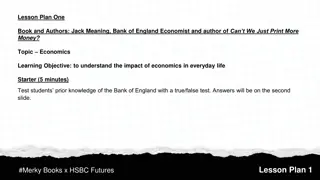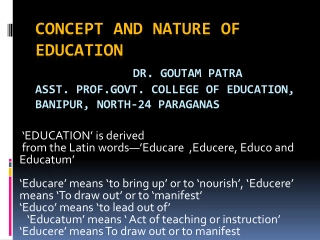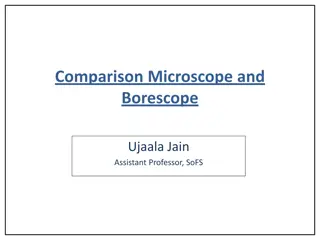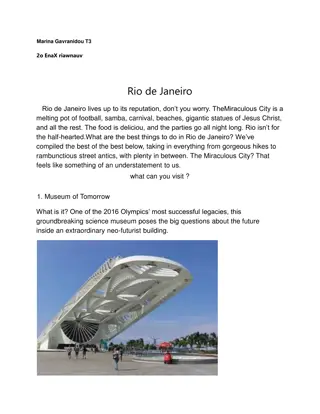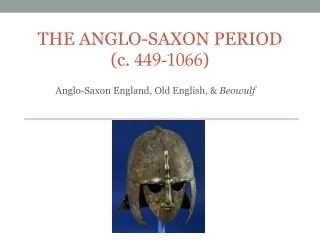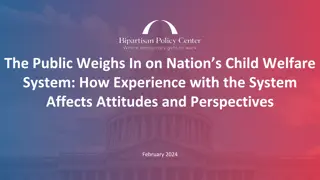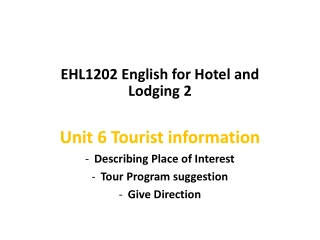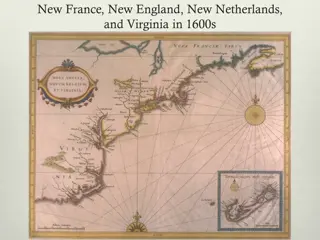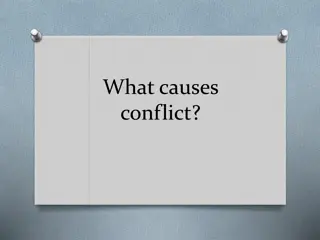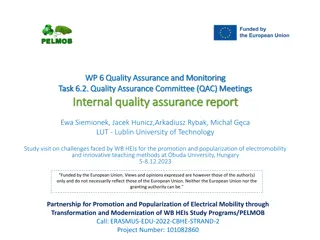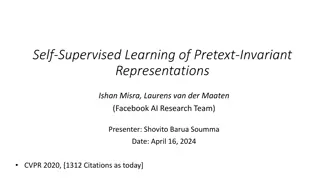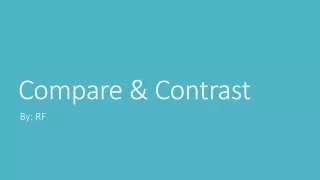Exploring Horace's Views on Life and Death
Delve into the philosophical musings of Horace, the ancient Roman poet, on topics such as the nature of existence, the inevitability of death, and the pursuit of a fulfilling life despite knowing one's mortality. Discover how Horace's writings reflect his views on living well in the face of uncertainty, the balance between human responsibility and fate, and the timeless relevance of his wisdom in today's world.
Download Presentation
Please find below an Image/Link to download the presentation.
The content on the website is provided AS IS for your information and personal use only. It may not be sold, licensed, or shared on other websites without obtaining consent from the author. Download presentation by click this link. If you encounter any issues during the download, it is possible that the publisher has removed the file from their server.
Presentation Transcript
Todays Lesson Today s Lesson Who was Horace? What was the political climate he was writing in? What was his views on living well when faced with the inevitability of death? How did he view human responsibility vs divine will & fate? Lion King - https://www.youtube.com/watch?v=kaOIxll4LCA
Exam Qs Exam Qs - - 2020 2020 (iv) (a) From your reading of the poems by Horace on your course, what, in your opinion, is his attitude to death? (25) (b) Does Horace seem like a person who enjoyed life? Explain your answer with reference to the prescribed poems. (25)
Exam Qs Exam Qs 2020 Marking Scheme 2020 Marking Scheme (iv) (a) Horace thinks about death a good deal. He constantly reminds us that it awaits us all and that it cannot be avoided or even postponed. We will have died, our goods cannot come with us and our heirs will not grieve for long. Our expensive wine will be spilt on the marble floor. When we reach the Underworld, our pedigree, good character or eloquence will not make any difference. It doesn t matter, which gods we worship, it is inevitable and will happen. When it happens, no one can buy even an extra minute. Even Diana or Theseus could not bring back their loved ones from the dead. This day s thine own, the next may be denied, To morrow and her works defy. Gather Ye Rosebuds and Enjoy the Present Hour are the poems featuring the theme that death is certain, so we might as well enjoy today. One of the pieces of advice that he gives is to stop hoarding for the future as in We All Must Die, Ode to Spring and Enjoy Your Possessions . as it is pointless. We should therefore enjoy each day and make the most of friends, wine and what we own. Horace s view of the afterlife is a gloomy one. There is no sense of there being any happiness in the underworld. Three developed points. (9, 8, 8.) (25)
Exam Qs Exam Qs - - 2017 2017 (ii) (a) From your reading of the poems by Horace on your course, describe his philosophy on life. (35) (b) Do you think that the philosophy of Horace has any relevance to us today? Give reasons for your answer (15)
(ii) (a)All the prescribed poems by Horace are relevant to his philosophy of life. Good answerswill focus on Horace s insistence on living for the day, something which is such a constant feature of his work. This day s thine own, the next may be denied , Tomorrow and her works defy . Gather Ye Rosebuds and Enjoy The Present Hour are the poems featuring this theme. Linked to this is the inevitability of death; we all must die, stop hoarding for the future as in We All Must Die, Ode to Spring and Enjoy Your Possessions While They Are Yours. Other elements of his philosophy include the idea that the quiet life is best and that one should avoid stress and be content with little as in The Good Man Need Fear Nothing and A Quiet Life. In The Town Mouse and The Country Mouse, and in Rustic Joys, Horace shows his disdain for the hectic pace and above all, the materialism of city life and prefers the slow pace and authenticity of rural living. He sees power and money as a kind of purple slavery . He values love highly and also places a very strong worth on friendship as we can see in Journey to Brundisium and Enjoy the Present Hour. Nor Love, nor Love s delights disdain; Whate er thou gettest today is gain. (b) Engagement, 14; Development, 14; Overall Evaluation, 7. (35 marks) Exam Qs Exam Qs 2017 Marking 2017 Marking Scheme Scheme
Exam Qs Exam Qs 2017 Marking Scheme 2017 Marking Scheme (b) Candidates will probably say yes. Points here might include: Horace s concerns are universal and timeless. He writes about the shortness of life and how death is inevitable. He urges us to seize the day and to enjoy life while we can as we do not know what the future holds. This is as true today as it was when he was writing. Candidates may also make the point that as a city-dweller, his sentiments about the stresses of city life strike a chord with many modern urban based readers. The longing to escape from the hustle and bustle of city living is a very current theme. Horace s devotion to his friends and his high estimation of the importance of friendship is just as significant today as it was 2,000 years ago. His combination of wisdom, common sense and humour makes his sentiments relevant to today s readers. Two explained reasons. (8, 7.) (15 marks)
From your reading of the prescribed poems, how would you describe Horace s philosophy of life? Exam Qs Exam Qs - - 2006 2006
Exam Qs Exam Qs 2006 Marking 2006 Marking Scheme Scheme Good answers will focus on Horace s insistence on living for the day something which is such a common feature of his work. This day s thine own, the next may be denied , To-morrow and her works defy . Linked to this is the inevitability of death; we must all die, stop hoarding for the future. Other elements of his philosophy are: The quiet life is best. Avoid stress, be content with little. Rural life is better in every way to city life. Nor Love, nor Love s delights disdain. Horace is also the poet who values friendship highly.
SON OF AN EX-SLAVE In 65 B.C., Horace was born in the region of Samnium in Southern Italy there people were not Roman but allies (subject peoples) of Rome. Horace s father was a libertus or freedman. He had probably been enslaved during the Social War in 80 B.C. a war over full Roman citizenship for all of Rome s Italian allies. He would have been freed soon after and given Roman citizenship. Horace had a close relationship with his father, who spent a lot of money to ensure his son had a good education in Rome. He even wrote a poem as tribute to his father (Satire 1.6). Top Ten Quotes - https://www.youtube.com/watch?v=H3F_W5sXRTg&t=1s In Our Time - https://www.youtube.com/watch?v=M5nl02SFptg
PHILOSOPHY & THE ARMY As a young adult, Horace left Rome and headed for Athens, Greece. Here he studied philosophy in Plato s Academy Plato was long dead. In Horace s day the primary philosophers teaching there would have been Epicureans and Stoics. Horace would have gained access to the public libraries and become acquainted with Greek poetry, art, and philosophy. In 44 B.C., Julius Caesar was murdered, and the Roman world was turned upside down. Caesar s murderers, Cassius and Brutus, came east to Greece looking for young men to join their army to fight the supporters of Caesar, Mark Antony and Octavian (later Augustus). Horace joined and was made a military tribune (officer) because of his education, an unusual role for the son of an ex-slave.
Watch the following clip & summarise the views of Stoicism TASK Ted Ed - https://www.youtube.com/wat ch?v=R9OCA6UFE-0
In 42 B.C., Brutus and Cassius were defeated by Octavian and Mark Antony at the Battle of Philippi. Horace says, humorously, that he apparently fled the battle, dropping his shield as he did so; a humiliating and cowardly act. DEFEATED, HOMELESS, POETRY He immediately sought a pardon from Octavian, which was granted. However, Octavian was confiscating land from Romans particularly supporters of his enemies & took Horace s family estate (proscriptions). Horace says he was destitute, but he probably had a mediocre job as a civil servant in Rome. It was then he turned to poetry.
HORACES PATRON Horace s came to know Virgil (his closest friend) and was introduced to the patron of poetry Maecenas a close ally of Augustus. Horace developed a close relationship with Maecenas. As is often the case with Patrons, Maecenas gifted a farm to Horace. Through Maecenas, Horace did become closer to the Emperor and began to respect him despite his possible Republican sympathies. Horace and Maecenas died within the same year and were buried near each other
Carpe Diem seize the day is a quote from Horace and a common phrase today. The philosophy Horace probably studied include Epicureans. This philosophy was founded by a Greek called Epicurus (340-271 B.C.). He thought this philosophy in what he called The Garden in Athens. School of Life - https://www.youtube.com/watch?v=Kg_ 47J6sy3A CARPE DIEM Ted Ed - https://www.ted.com/talks/marc_nelson _epicureanism_ancient_answers_to_mod ern_questions
EPICUREANISM MAIN IDEAS Death is inevitable, so don t fear it! A life of moderation & tranquillity (peace) is key Pleasure is the ultimate goal, in moderation Pursuing politics cannot lead to this tranquility A quite life in the country, reflecting with friends is the ideal
STOICISM Another major philosophy was Stoicism. The main principals are: Death is inevitable and all fate is predetermined (predestined) so there is no need to fear death. Pain is inevitable & destined, so it must be born We should reject all desires and live a life of virtue, without sin.
HORACES VIEWS Horace s attitude of Carpe Diem living in the present enjoying the present hour is very Epicurean. His attitude to a simple life in retreat away from public life, soldiery, or legal matters is very unstoic. However, his rejection of life spent seeking riches is very Stoic.
HORACES VIEWS Death is inevitable The shortness of life Enjoy the present hour Carpe Diem. The simple/quiet life is best. Friendship is important to a happy life.
LIVING WELL 4.13. Examine what constitutes living well when faced with the inevitability of death according to Socrates as depicted in Plato s Crito and Horace in the Odes and Epodes What is Horace s view on what it takes to live well in his Odes & Epodes?
LIVING WELL You can focus on some of the following: Gather ye Rosebuds Enjoy The Present Hour We All Must Die Cease to Mourn The Good Man Need Fear Nothing Enjoy Your Possession While They Are Yours Ode to Spring A Quiet Life Rustic Joys
How does these views contradict or align with our own views on living well ? LIVING WELL
HUMAN WILL VS DIVINE FATE 4.14. Explore how the relationship between human decision and responsibility on the one hand and divine will and fate on the other is viewed by Socrates as depicted in Plato s Crito and Horace in the Odes and Epodes What is Horace s view on what it takes to human decision & responsibility vs divine will & fate in his Odes & Epodes? You can focus on some of the following: Gather ye Rosebuds Enjoy The Present Hour Enjoy Your Possession While They Are Yours Ode to Spring
EXTRA VIDEOS Poetry of Horace - https://www.youtube.com/watch? v=la-wggnaM_c Horace s Odes - https://www.youtube.com/watch? v=gWDwHOmIQ1I
Todays Lesson Today s Lesson Who was Horace? What was the political climate he was writing in? What was his views on living well when faced with the inevitability of death? How did he view human responsibility vs divine will & fate? Lion King - https://www.youtube.com/watch?v=kaOIxll4LCA



